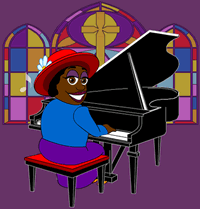Thomas A. Dorsey
 |
| Learn to Play Now |
Thomas Andrew Dorsey,
known as the “Father of Gospel Music,”
was born on July 1, 1899 in Villa Rica, Georgia. Dorsey’s father was a minister
and his mother a piano teacher. Dorsey was exposed to spirituals and Baptist
hymns as a child and learned to play the piano by watching pianists at a
vaudeville theater on Decatur Street in
Atlanta.
After studying music
formally in Chicago, he became an agent for Paramount Records. He later put
together a band for Ma Rainey called the “Wild Cats Jazz Band” in 1924. Learn to play this great music now.
Around 1928, Dorsey had a
spiritual conversion but continued composing and performing the blues. Under
the name, Georgia Tom, he teamed up with Tampa Red (Hudson Whittaker), with
whom he recorded the 1928 hit record, “Tight Like That,” that went on to sell
more than 7 million copies.
Personal tragedy led
Dorsey to leave secular music behind and began writing and recording what he
called “gospel” music. He was the first to use that term. His first wife,
Nettie, died in childbirth in 1932 along with his first son. In his grief, he
wrote his most famous song, and one of the most famous of all gospel songs,
“Take My Hand, Precious Lord.” Lean to play this great music now.
“Precious Lord” has been
recorded by Elvis Presley, Mahalia Jackson, Aretha Franklin, Clara Ward, Roy Rogers,
and Tennessee Ernie Ford, among hundreds of others. It was a favorite gospel
song of the Rev. Martin Luther King, Jr. and was sung at the rally the night
before his assassination, and at his funeral by Mahalia Jackson, per his
request. It was also a favorite of President Lyndon B. Johnson, who requested
it to be sung at his funeral.
Dorsey wrote “Peace in
the Valley” for Mahalia Jackson in 1937, which was later made popular by Elvis
Presley. Dorsey composed over 1000 songs in his lifetime and was the first
African American elected to the Nashville Songwriters Hall of Fame.
He died in Chicago,
Illinois on January 23, 1993. Learn to play this great music now!
Blog with you later
Dr. Jefferon
Check us out at: www.jeffersonpresents.com
References
-
Horace Clarence Boyer, How Sweet the sound: The Golden Age of Gospel Elliott and Clark.
-
Michael W. Harris, The
Rise of Gospel Blues: The Music of Thomas Andrew Dorsey in the Urban Church
Oxford University Press.
-
Tony Heilbut, The
Gospel Sound: Good News and Bad Times Limelight Editions.
-
Bernice Johnson Reagon, We’ll Understand It Better By And By: Pioneering African-American
Gospel Composers Smithsonian Institution.
-
Eileen Southern, The
History of Black Americans: A History, W.W. Norton & Company.


